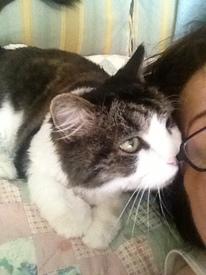Has anyone experienced this?

VeganEquestrian
Posts: 59 Member
Hi, I'm recovering from anorexia. I've already gained 10 pounds and have almost 10 more to go until I'm at a 'healthy' weight.
I can not stop binge eating!!!! I hate it. Like I will eat 1500 cals in one binge. It happens weekly if not more. And it destroys confidence and makes me terrified of food and never want to eat because I'm scared I'm going to binge again!!!
How do I stop?
Has anyone had a problem with binging during recovery from a restrictive disorder?
I can not stop binge eating!!!! I hate it. Like I will eat 1500 cals in one binge. It happens weekly if not more. And it destroys confidence and makes me terrified of food and never want to eat because I'm scared I'm going to binge again!!!
How do I stop?
Has anyone had a problem with binging during recovery from a restrictive disorder?
0
Replies
-
It sounds like you still have a problem. You're still obsessing about food and worrying about eating too much. I hope you're still in therapy.0
-
No therapist. I have no money.
And that's why is said recovering, not recovered.0 -
You can find support groups to help you that will not cost anything.0
-
I struggle with binge eating but have not had anorexia. I'm also still working on myself and trying to find a better relationship with food. I try to eat smaller meals throughout the day that are high in protein so that I don't find myself overindulging in one sitting. (Although this doesn't always work it has helped me be more successful in the past)
Wishing you good luck on your journey!0 -
You can find support groups to help you that will not cost anything.
I'm pretty sure that's exactly what she's doing here - looking for support.
I'm sorry I don't know much about anorexia and can't give you much advice, but I think you are doing the right thing by reaching out, and hopefully someone can point you in the right direction.0 -
once you get to a healthy weight you should find control again, your body is craving the nutrients cause its struggling, dont worry just keep gaining the weight you need, here if you need someone to talk too0
-
I just did a quick search for "recovering ED" in the groups section of mfp and it looks like there are a few there you can try.0
-
This happened to me in my recovery as well. It was as if once your body started getting the nutrients it needed it needed more and more. I actually came across a blog that had a good write up about this sort of thing http://www.youreatopia.com/blog/2012/5/22/extreme-hunger-what-is-it.html
I'm assuming you aren't working with a dietician? Are you making up any meal plans? That might help give more structure to your daily eating.0 -
I'm in no way an expert on recovery and I'm hoping that some of the other MFP members with experience with recovery will see this topic and chime in, but it's my understanding that going through periods of binge-eating during recovery is normal.
From this article http://www.youreatopia.com/blog/2012/10/31/bingeing-is-not-bingeing.html:
"However, it is important to note that the process of recovery from an energy deficient state most certainly involves a period of extreme hunger and eating. It is a transient condition that disappears once energy balance is restored."
Another good article: http://www.youreatopia.com/blog/2012/5/22/extreme-hunger-what-is-it.html
"Extreme hunger is a common experience for almost everyone undergoing recovery from any kind of restrictive eating disorder.
Next to the presence of edema (water retention), extreme hunger is one of the most anxiety-provoking elements of recovery.
It can happen at any time in the recovery process and varies for everyone as to how long it lasts. Many of you will have already seen this information, but it is worth repeating:
Extreme Hunger:
1) Starts day one.
2) Starts a few days or weeks in.
3) Does not happen.
4) Lasts from months two through six uninterrupted.
5) Shows up and disappears intermittently throughout.
6) Shows up near the end of weight restoration.
7) Blasts away like a fire hose from start to finish.
And if I have missed any variation in the above 7 items I can assure you that it is still perfectly normal.
During this time you will want (and very much need) far more than 2500-3500 calories a day and may find yourself consuming anywhere from 6,000-10,000 calories in a single day. That causes panic for pretty much everyone on the restrictive eating disorder and they lock down on the incorrect thoughts that they will “just keep going” and are “bingeing”.
The enemy is restriction. When extreme hunger hits then you commit to never eating less than the recommended guidelines* on any given day no matter what you ate the day before. It is restriction that will pull you to relapse, not the extreme hunger itself."
Again, I'm not an expert and I'm not trying to give you any kind of medical advice. The youreatopia site has a ton of information and can be a great resource.0 -
I experienced that in recovery from anorexia. Once I got to a healthy weight and my body was functioning regularly again with all the nutrients I need and stuff my binges have been less frequent. They still happen, but much less than recovery, when my body was craving all the nutrients and tastes I'd deprived it from so long.
I already mentioned this in a message to you, but am just bumping this post so more people see it and respond.0 -
Hi, I'm recovering from anorexia. I've already gained 10 pounds and have almost 10 more to go until I'm at a 'healthy' weight.
I can not stop binge eating!!!! I hate it. Like I will eat 1500 cals in one binge. It happens weekly if not more. And it destroys confidence and makes me terrified of food and never want to eat because I'm scared I'm going to binge again!!!
How do I stop?
Has anyone had a problem with binging during recovery from a restrictive disorder?
it seems you still have a problem. Don't forget the healthy food is a friend which helps you to build a strong body!
If you dont have money to see a therapist, I strongly recommend you to do some reasearch to understand how the body works...
And stop counting the number of kcal, when you try to gain weight, you have to do a kcal excess.0 -
Restrictive eating leads to binging.0
-
I know that restrictive eating leads to binging, but how can I stop restricting if I can't stop binging? I feel like I'm stuck...0
-
Just to sum it up .....you were so use to not eating that when you finally did to overcome the fact of not eating and started eating again.....you body was overwhelmed and started consuming everything you have been missing and your brain was sending out waves of FOOD FOOD .....and it causes you not to resist it until your body says oh I'm full even if it is 1500 calories later.....now instead of not eating you have to tell your body I'm full with smaller portions and mentally stop yourself from doing it.....0
-
Start eating a rational diet, of near 2000 calories a day. Eating the foods you enjoy.I know that restrictive eating leads to binging, but how can I stop restricting if I can't stop binging? I feel like I'm stuck...0 -
How many calories is your recovery meal plan? Having it at less than 3000 may mean you aren't fueling your body and mind enough so they are screaming for food. Also, restricting foods in recovery can lead to your' binges'. 'Binging' is not bad in recovery. You need to gain weight anyway so any extra calories are great. eat all that you want, and then move on and eat all that you want the next time oyu are hungry. I am also in recovery, feel free to msg me
 0
0 -
I don't know anything an recovering from an ED but it looks like you are getting excellent advice. The only thing I can add is try to relax and breath and trust your body right now. It's doing what it needs to do to get healthy by sending hunger signals out.
I can only imagine how scared you must be. Do you have anyone you can just talk to, a parent, a friend, clergy? That may help with your fear and anxiety. Or if you visit the nationaleatdisorders.org website maybe there is a toll free number you can call to get access to free programs in your area.0 -
1500 calories for a meal is a binge?
Apparently I binge just about every day....0 -
Start eating a rational diet, of near 2000 calories a day. Eating the foods you enjoy.I know that restrictive eating leads to binging, but how can I stop restricting if I can't stop binging? I feel like I'm stuck...
Recovering from anorexia needs a higher intake than that.
Think the intake of a teenage boy trying to bulk...0 -
That is perfectly normal in the early stages of recovery from starvation. Your body has been deprived of the calories and nutrients it needs to survive. What it is trying to do right now is replenish. Don't think of the binges as binges, think of them as your bodies way of trying to recover. The binges will get smaller in due time with the right amount of patience, recovery, and therapy. If you really cannot afford a therapist, join a support group. Group therapy tends to be cheap (the rate is split between patients, so it is sometimes as cheap as $15 a session).
I am in recovery from a restrictive eating disorder myself. I still 'binge' from time to time, but a lot less than I did in the first months. So, rest assured knowing that it DOES get better. Depending on how long you restricted, you may need as many as 3,000 calories a day to refuel. Some people require more than that. It helps if you space meals out. Instead of three a day, do six a day. This helps prevent binging, helps get you on a schedule, and helps so that it doesn't hurt to eat. 2,000 is not really enough for someone in recovery from an ED. It was for me, but one has to keep in mind that I didn't get below a healthy BMI. So, I didn't have as much weight to gain back.
And yes, waldo... for someone recovering from restriction, 1,500 feels like a really big binge. I could explain what it does to our body when we eat that much in one sitting (the digestive upset, the constipation, the bloating, the lightheadedness, the anxiety). But I'll spare the details. Some of it is gross. But, OP, that gets easier, too.
Just take a breath and remind yourself. It gets better. You can do this. :flowerforyou:
I'm going to add you. You don't have to accept, but if you want to, you can message me in the future if you need someone to talk to. Recovery is hard on your own. I'd know. Take care.0 -
And yes, waldo... for someone recovering from restriction, 1,500 feels like a really big binge. I could explain what it does to our body when we eat that much in one sitting (the digestive upset, the constipation, the bloating, the lightheadedness, the anxiety). But I'll spare the details. Some of it is gross. But, OP, that gets easier, too.
I get that. Whether it is recovering from an ED or bulking for muscle gain, a lot of the same things occur. They are after all about the same process. The big difference being that when bulking you don't have that hunger from being malnourished so have to force it down even if you aren't hungry.
And yes, I also understand malnourished hunger quite well, the hormones involved and what it feels like, cutting for sharper abs has exactly the same side effects if you do it too long. Dreaming of thanksgiving dinner. Permahunger that doesn't go away, even if you eat a large meal. Nerotic, almost frantic focus on your hunger and need to eat. This is perfectly normal, signs of the hormone leptin and its interactions with ghrelin (which makes you feel hungry) and serotonin (which makes you not crazy). Eating a massive whallop of carbs (think 1000+ cal of pure carbs in a single sitting) will make it go away temporarily, for a few days usually (it will cause a strong leptin pulse that will linger a bit). Eating at maintenance or above sustained for a few weeks/months (depending on how bad you let it get, obv ED recovery is going to be on the long end) will make it go away for good, or at least until you cut too long when too lean again.
Where you draw the line with what is and isn't a binge, 1500 cals is quite small. I mean any standard bacon cheeseburger with fries in a bar with a beer on the side is going to be over 1500 cals. A full stack of pancakes with butter, whipped cream, and syrup and a side of hash browns and glass of OJ at the IHOP is going to be over 1500 cals.0 -
This.And yes, waldo... for someone recovering from restriction, 1,500 feels like a really big binge. I could explain what it does to our body when we eat that much in one sitting (the digestive upset, the constipation, the bloating, the lightheadedness, the anxiety). But I'll spare the details. Some of it is gross. But, OP, that gets easier, too.
I get that. Whether it is recovering from an ED or bulking for muscle gain, a lot of the same things occur. They are after all about the same process. The big difference being that when bulking you don't have that hunger from being malnourished so have to force it down even if you aren't hungry (and yes, I also understand malnourished hunger quite well, the hormones involved and what it feels like, cutting for sharper abs has exactly the same side effects if you do it too long).
Where you draw the line with what is and isn't a binge, 1500 cals is quite small. I mean any standard bacon cheeseburger with fries in a bar with a beer on the side is going to be over 1500 cals. A full stack of pancakes with butter, whipped cream, and syrup and a side of hash browns and glass of OJ at the IHOP is going to be over 1500 cals.
Some of my normal meals are 1500-2000 calories regularly.
I consider a binge 2500+0 -
EDs are all about control; is there any education/materials out there that explains the hormones involved, what various symptoms mean, and how you can control them?
I mean bodybuilder types (and science) has worked out much of the anti-starvation system.
Leptin is the master controller, like a thermostat. When high there are no symptoms. When low, symptoms get increasingly more powerful the lower it gets. Leptin is created in fat tissue by a signal sent by your glycogen reserves (stored carbs in the body). Having high glycogen levels or high fat levels is enough to create stable leptin levels, which is why when lean carbs are going to minimize the negative side effects the fastest and easiest. This signal goes hand in hand with your energy state, leptin levels drop when you are in a calorie deficit, rise when you are in a calorie surplus. If you are going to binge, binging on pure carbs will reduce or eliminate the feeling you need to binge for the near future.
Ghrelin is created in the stomach and makes you feel hungry (the rumbly tummy feeling when you are hungry around meal time, that is ghrelin). Ghrelin is released in anticipation of your usual schedule, if you always eat at a particular time, you will always be hungry at that time, even if you don't really have any need for food. As leptin levels drop, eventually the body starts really pumping on the ghrelin, which makes you hungry 24/7, meals having no effect on it.
Sex hormones interact strongly with leptin. As leptin levels drop so too does sexual desire. Even further decline will cause your reproductive system to totally turn off. Men lose the ability to get wood, women lose their period. Reproducing is a calorie expensive process, low leptin tells the body it is starving, which causes the reproductive system to shut off.
Thyroid hormones (and possibly brown/beige fat) also interact with lepin. They can modulate your metabolism, low leptin will cause the body to throttle back your metabolism as much as possible to conserve itself. One obvious side effect of this is being ccccooooolllldddd.
Finally leptin also interacts with serotonin. A lack of serotonin pretty much makes you crazy. When leptin gets low, this will cause you to become extremely neurotic about food, thinking about it 24/7, absolutely frantic to eat. Again, this is a chemical process in the body, a side effect of low leptin. You fix this by raising leptin levels.0 -
I know that restrictive eating leads to binging, but how can I stop restricting if I can't stop binging? I feel like I'm stuck...
How can you stop restricting if you can't stop binging? What do you mean? Are you restricting to compensate for your binges? Because that's a big no-no, especially in AN recovery. If you truly want to stop "binging", eat more. Keep eating your recommended amount. The more consistent you are with your eating, the less likely you are to "binge" in the long run.
Are you still counting calories? How much are you eating on a non-binge day? Maybe you're still not eating enough. Personally, my binges stopped once I reached a BMI that was healthy for my body (and by that I don't mean 18.5 - not everyone's considered healthy at that BMI).0 -
On a non binge day I'm eating like 2500 cals! My bmi is 17.2... And I do around 600-1000 cals of exercise a day...0
-
Stop exercising.0
-
I'm a working student under the guidance of a pro rider and I'm working on becoming a pro myself, so I exercise every day as part of my job.0
-
For what it is worth:
"Binge" eating is extremely common in people recovered/recovering from AN. The normal hormonal feedback governing appetite is derranged, and takes a very long time to re-balance (even after reaching healthy weight it can go on for months or longer).
Strategies to reduce the 'binges' and the mental fallout include:
1) Ensure you are eating enough calories, no sly 'skimping on portions' or 'forgetting' to eat
2) Include planned snacks throughout the day, you should be having three main meals and three snacks, so you do not go longer than about 3 hours between eating something
3) Eat a balanced mix of carbs/protein/fats, and aim for slow-release energy sources (eg complex carbohydrates with some protein and fat at the same time)
4) Ask friends/look on MFP to get an idea of what other people eat, and you will see that what you call a 'binge' may be a regular meal for someone else
5) If you do have a 'binge', be kind to yourself. See if you can work out what triggered it & how to reduce the risk of it happening again, then start over with a 'clean slate' (i.e. no compensatory restricting or extra exercising).
:flowerforyou:0 -
I'm a working student under the guidance of a pro rider and I'm working on becoming a pro myself, so I exercise every day as part of my job.
Well this is a problem. Is it possible you're now dealing with a different type of disorder? Binging covered up by exercise? I forget the name of it but when I was in treatment for binge eating, I had a couple of people in my group who did this.
I'm not sure how you can be a professional athlete (I think?) if you're not eating right.0 -
This.And yes, waldo... for someone recovering from restriction, 1,500 feels like a really big binge. I could explain what it does to our body when we eat that much in one sitting (the digestive upset, the constipation, the bloating, the lightheadedness, the anxiety). But I'll spare the details. Some of it is gross. But, OP, that gets easier, too.
I get that. Whether it is recovering from an ED or bulking for muscle gain, a lot of the same things occur. They are after all about the same process. The big difference being that when bulking you don't have that hunger from being malnourished so have to force it down even if you aren't hungry (and yes, I also understand malnourished hunger quite well, the hormones involved and what it feels like, cutting for sharper abs has exactly the same side effects if you do it too long).
Where you draw the line with what is and isn't a binge, 1500 cals is quite small. I mean any standard bacon cheeseburger with fries in a bar with a beer on the side is going to be over 1500 cals. A full stack of pancakes with butter, whipped cream, and syrup and a side of hash browns and glass of OJ at the IHOP is going to be over 1500 cals.
Some of my normal meals are 1500-2000 calories regularly.
I consider a binge 2500+
Binges aren't about numbers. They're about behaviors and emotions.0
This discussion has been closed.
Categories
- All Categories
- 1.4M Health, Wellness and Goals
- 398.5K Introduce Yourself
- 44.7K Getting Started
- 261K Health and Weight Loss
- 176.4K Food and Nutrition
- 47.7K Recipes
- 233K Fitness and Exercise
- 462 Sleep, Mindfulness and Overall Wellness
- 6.5K Goal: Maintaining Weight
- 8.7K Goal: Gaining Weight and Body Building
- 153.5K Motivation and Support
- 8.4K Challenges
- 1.4K Debate Club
- 96.5K Chit-Chat
- 2.6K Fun and Games
- 4.8K MyFitnessPal Information
- 18 News and Announcements
- 21 MyFitnessPal Academy
- 1.5K Feature Suggestions and Ideas
- 3.2K MyFitnessPal Tech Support Questions
















